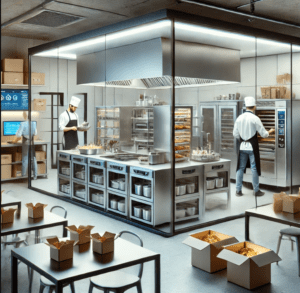"How cloud kitchen Are Revolutionizing the Food Industry and Why You Need a Food License to Start One"
Ghost kitchens, also known as cloud kitchens or virtual kitchens, are rapidly transforming the food industry. In today’s on-demand food delivery culture, the need for traditional brick-and-mortar restaurants is fading, making way for these innovative kitchen setups. However, starting a ghost kitchen isn’t as simple as cooking and delivering meals. You must comply with food safety regulations, including obtaining a <strong>Food License</strong> or <strong>FSSAI Registration</strong> to operate legally and safely.
What Are cloud kitchen / Ghost Kitchens?
Ghost kitchens are professional food preparation facilities that cater solely to online orders. They do not have a dine-in option or a traditional storefront, and they operate through food delivery apps like Swiggy, Zomato, and Uber Eats. These kitchens allow entrepreneurs to enter the food industry with lower startup costs, focusing purely on the quality of food and delivery
Why Ghost Kitchens Are Trending
Ghost kitchens are rising in popularity due to several reasons:
- Cost-Effective Model: You can bypass high real estate costs and front-of-house staff by operating from a virtual kitchen. This has made it easier for small businesses and startups to break into the food market.
- Growth in Online Food Delivery: The rise in online food ordering has fueled the demand for ghost kitchens, especially in urban areas where convenience is key.
- Faster to Scale: Ghost kitchens allow you to scale your business more quickly. You can start with one kitchen and expand across multiple locations in different cities without much overhead.

Do You Need a Food License for a cloud kitchen / Ghost Kitchen? Absolutely!
Running a ghost kitchen requires compliance with the same regulations as any other food business. You need a Food License under FSSAI to ensure that the food you’re preparing is safe for consumption. Here’s why:
- Consumer Trust: Customers want assurance that the food they are ordering online is prepared in a clean and hygienic environment. A food license demonstrates that your business meets these standards.
- Avoid Legal Complications: Operating without a valid FSSAI Registration could result in hefty fines, business closures, or even imprisonment. A food license ensures you are operating within the bounds of the law.
- Partnerships with Food Delivery Apps: Most delivery apps require restaurants and kitchens to have a valid food license. Without it, you may miss out on valuable partnerships with platforms like Zomato or Swiggy.
To apply for a food license, follow these steps:
- Determine the Type of Food License You Need: Depending on the size of your ghost kitchen and the scale of your operations, you may need a basic, state, or central food license.
- Submit the Required Documents: You will need to provide proof of identity, address, and business details, along with your kitchen’s layout and food safety management plan.
- Apply Through FSSAI’s Online Portal: Submit your application through the FSSAI’s official website, ensuring all details are accurate to avoid delays.
Conclusion
cloud kitchens are changing the way we think about food businesses, but they still require the same level of legal compliance as traditional restaurants. Obtaining a is not just a legal requirement, it’s a cornerstone of building trust with your customers and partners. If you’re considering launching a ghost kitchen, be sure to prioritize your FSSAI registration to ensure smooth, legal operations. or expert assistance with “https://poweroffactorial.in/fssai-license/” FSSAI Registration, visit Power of Factorial Business Solutions, and we’ll guide you through the process.
